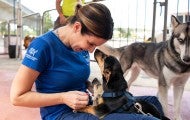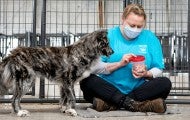Do your homework So you’ve decided to add a new pet to your family. First, you should answer some questions: What kind of pet will be the best fit for your household? Do you have enough time to devote to the daily needs of a dog? Is there someone in your household who is allergic? What about a non...
The Humane Society of the United States was founded to tackle animal welfare challenges that were historically beyond the reach of local organizations, supplement the essential work of animal shelters and rescues by addressing the root causes of animal cruelty, advocate for stronger laws to ensure...
Aug. 16, 2023: In the aftermath of devastating wildfires that claimed the lives of a still unknown number of people on Maui, we mourn with our supporters and colleagues in Hawai'i. As with most disasters, the loss of human life and the financial and other damages incurred by individuals, governments...
About our volunteers Animal rescue volunteers (ARVs) work with our Animal Rescue Team to help save animals who are victims of illegal animal cruelty and disasters. When we respond—whether to a hurricane, large-scale neglect case, dogfighting or commercial breeding operation—animal rescue volunteers...
Extreme weather events like wildfires can kill wild animals, either from the fire itself, through smoke inhalation or through loss of habitat. Animals who are very young, old or otherwise unable to move away quickly are particularly vulnerable. Wild animals cope with wildfires in a variety of ways...





